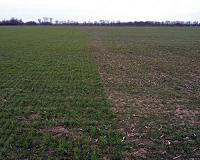 |
Sofia (AFP) Jan 27, 2011 Bulgaria's environment ministry set an annual brown bear hunting quota for the first time on Thursday, following a decades-long ban on killing the protected animals. The ministry said in a statement it would allow the hunting of 17 animals this year, with dispensations distributed among seven bear-populated regions. The quota was determined based on three recent tallies of the bear population, which found that some 540 to 560 bears roam Bulgaria's mountains. Seven of the dispensations were granted to the Smolyan region, in the southern Rhodope mountains, where a brown bear killed a villager in July 2010, the first such accident in decades. The killing and a number of attacks on flocks and beehives in the region sparked angry cries for a cull and eventually prompted parliament in end-2010 to open between three and eight percent of the bear population for hunting. Environmentalists immediately slammed the changes as catering to the interests of hunting lobbies, under the guise of attempting to curb poaching. "We had to obey the law," ministry expert Ruslan Serbezov told AFP, noting however that the government had set the quota at the lowest three-percent end of the scale, while Bulgaria's bear habitats were by no means overpopulated. Bears are a protected species in Bulgaria and their killing was strictly banned for more than 20 years, except in cases of accidents and with special permits distributed on a case-by-case basis. The move comes as the European Commission launched legal action against Sweden on Thursday for allowing hunters to shoot 20 wolves this year even though the species is threatened with extinction. The European Union's executive arm raised concerns about Sweden's wolf policy, including the licensed hunting of a protected species and the "arbitrary ceiling" of 210 wolves that was set for the animal's population. Swedish Environment Minister Andreas Carlgren said Sweden alone could decide whether or not to allow the hunt.
earlier related report The European Union's executive arm raised concerns about Sweden's wolf policy, including the licensed hunting of a protected species and the "arbitrary ceiling" of 210 wolves that was set for the animal's population. Sweden opened a hunting season on January 15 allowing hunters to kill 20 wolves. More than 6,700 hunters participated in the hunt, the commission said. As of Wednesday -- 11 days after the hunt started -- 18 of the 20 wolves had been killed, the Swedish environmental protection agency said. The hunt follows a 2009 decision by parliament to limit the wolf population to 210 animals, spread out in 20 packs, with 20 new pups per year, for a period of five years by issuing hunting permits in regions where wolves have recently reproduced. The Scandinavian country resumed wolf hunting last year when it set a quota of 27 wolves. It was the first wolf hunt since 1964. After almost disappearing, wolves have reproduced in the last three decades with sheep and reindeer increasingly under attack. The European Commission decided to open a formal infringement procedure, which can lead to a case before the European Court of Justice, which can impose hefty fines on EU states that violate the bloc's rules. Swedish Environment Minister Andreas Carlgren on Thursday reacted to the Commission's announcement and said Sweden alone could decide whether or not to allow the country's wolf hunt. "I am confident that we will be able to dispel the doubts that the Commission has on our wolf policy," he told reporters. "It is our conviction that decisions on the predator policy should be foremost taken in Sweden, near the people concerned, not in Brussels," he and Agriculture Minister Eskil Andersson said in a statement. Carlgren was holding a press conference to detail the next steps in the implementation of Sweden's 2009 wolf policy, which calls for the "genetic enhancement" of the country's largely inbred wolf population. He said new wolves "of Eastern origin," including from Finland, would be introduced into the Swedish population this year. The move could make way for a new hunt in 2012, Carlgren said, pointing out that the wolf population would be evaluated annually to determine whether a hunt was justified. This year's hunt was heavily criticised in Sweden, with environmental groups saying it was cruel and lacked scientific grounds. The Swedish Society for Nature Conservation said Thursday some 7,657 people had answered is call to protest by sending a letter to the EU environment commissioner through its website. The organisation lauded the Commission's decision to launch a procedure against Sweden.
Share This Article With Planet Earth
Related Links Farming Today - Suppliers and Technology
 Wheat Resistance Genes Failing, New Approach Needed To Stop Flies
Wheat Resistance Genes Failing, New Approach Needed To Stop FliesWest Lafayette IN (SPX) Jan 27, 2011 Many of the genes that allow wheat to ward off Hessian flies are no longer effective in the southeastern United States, and care should be taken to ensure that resistance genes that so far haven't been utilized in commercial wheat lines are used prudently, according to U.S. Department of Agriculture and Purdue University scientists. An analysis of wheat lines carrying resistance genes from ... read more |
|
| The content herein, unless otherwise known to be public domain, are Copyright 1995-2010 - SpaceDaily. AFP and UPI Wire Stories are copyright Agence France-Presse and United Press International. ESA Portal Reports are copyright European Space Agency. All NASA sourced material is public domain. Additional copyrights may apply in whole or part to other bona fide parties. Advertising does not imply endorsement,agreement or approval of any opinions, statements or information provided by SpaceDaily on any Web page published or hosted by SpaceDaily. Privacy Statement |